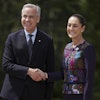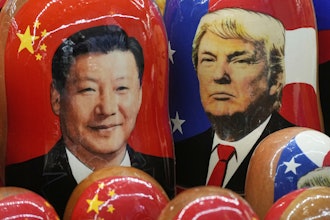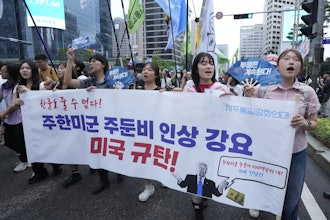
According to a new report from the tech-policy think tank Information Technology and Innovation Foundation (ITIF), President Trump is correct about China flouting global trade rules to the detriment of the U.S., but the group feels that economic nationalism is not the right response to the issue. Instead the foundation argues that the U.S. must pursue a new creed of constructive, alliance-backed confrontation, where policy makers put “America First”.
“China’s systematic mercantilism represents a threat not just to the U.S. economy, but also to the very soul of the global trading system,” said Robert D. Atkinson, ITIF’s president and the report’s lead author. “The U.S. response can’t be more flaccid appeasement, because the status quo is untenable. And it can’t be a retreat toward economic nationalism, because that would cede the global playing field. We need a new doctrine of constructive, alliance-backed confrontation — a version of ‘America First’ where America stands at the vanguard of an international coalition defending the norms of democratic, market-led capitalism against the mercantilist tactics of the top-down, state-led model. We should refuse to accept empty ministerial dialogues while China flouts trade rules. We have to insist on concrete results, and we have to be prepared to apply real pressure if China doesn’t change its behavior.”
The report from ITIF points out that China has set out to become the main economic rival of the U.S. through an approach of both defensive protectionism and offensive efforts to achieve global dominance across a wide array of advanced-technology industries key to U.S. economic and national security interests.
While the U.S. government has tried for more than two decades to counter China’s history of disregarding global rules and norms, China has only accelerated its efforts to overtake U.S. leadership in advanced industries. Without a change in U.S. policies toward China, America will likely lose even more U.S. jobs in advanced industries over the next 20 years. ITIF argues it is time for a new approach and that economic nationalism isn’t the solution.
“Engaging in dialogue in the hope that the Chinese government will listen and change its ways has not worked,” said Atkinson. “But simply slapping a tariff on Chinese goods will only make it harder for the United States to compete globally, because so much of what America exports involves pieces and parts originally imported from China. Economic nationalism would leave the global playing field wide open for China to shape a trading system to its own interests and pressure other nations who would have no choice but to cut flawed deals with the world’s new economic superpower.”
To achieve ITIF’s recommendations, the group urges the current administration to assemble an international coalition of market-based, rule-of-law economies that engage with China toward a more results-oriented approach. This direction should include holding China to specific goals — such as reducing its forced technology transfer and IP theft — as well as procedural goals, such as demonstrating a shift from predominantly export-led growth.
Click here to read the whole report and find out more.
Read summary here.






















